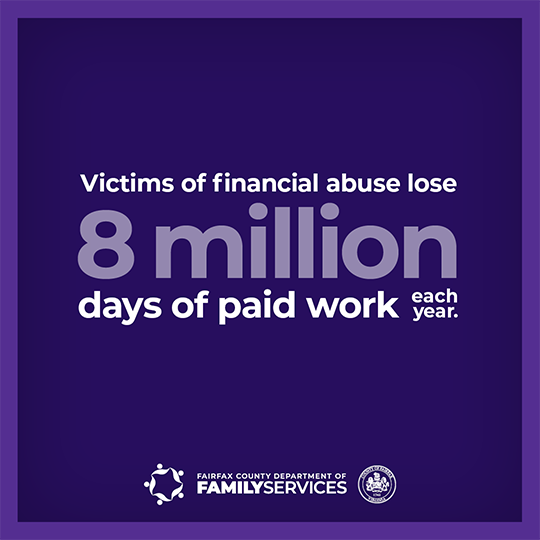(Posted 2021 February)
Ending gender-based violence requires us to see all the aspects of the issue. Often, when we think of intimate partner violence, we envision only bruises or broken bones—things we can see—or perhaps verbal abuse. But domestic violence takes many forms, including financial abuse, a subject that is often overlooked.
The truth is personal safety and economic security are inextricably linked for victims of domestic violence. Research from the Centers for Financial Security shows financial abuse is present in 99 percent of domestic violence cases.
 One way people who cause harm exert power and control is by denying their partners access to finances, jeopardizing their credit and limiting access to employment or education. For those seeking to leave an unhealthy relationship, fleeing can cause a huge strain on finances and have a lasting impact on financial security.
One way people who cause harm exert power and control is by denying their partners access to finances, jeopardizing their credit and limiting access to employment or education. For those seeking to leave an unhealthy relationship, fleeing can cause a huge strain on finances and have a lasting impact on financial security.
Forms of financial abuse can be subtle or overt but generally include tactics to limit the partner’s access to assets, conceal financial information or ruin a survivor’s financial profile. Even after a victim has left a violent partner, the impact of ruined credit scores, spotty employment histories and legal issues caused by the violence may make it difficult to pursue long-term economic security.
For many victims, concerns over their ability to provide financially for themselves and their children are a main reason for staying in or returning to a toxic relationship. In fact, 7 out of 8 domestic violence survivors return to someone who has harmed them because of financial abuse.
Whether someone who causes harm uses one tactic or multiple ones, here are 10 signs someone is being abused financially:
- Trying to control use of or access to money a partner has earned.
- Using a partner’s assets for their personal benefit without asking.
- Taking money or using credit cards without permission.
- Ruining a partner’s credit history by running up limits and then not paying bills.
- Demanding a partner turn over paychecks, passwords and credit cards.
- Pressuring a partner to quit a job.
- Harassing a partner at work by calling, texting or dropping by unannounced.
- Preventing a partner from working by hiding their keys, unhooking their car battery, taking the car without permission or offering to babysit and then not showing up.
- Hiding or taking funds and putting them in a private account.
- Controlling the “purse strings” or establishing unrealistic limits or allowances.
Financial abuse doesn’t get better with time. Instead, it often escalates and can lead to other types of abuse.
Pathways to safety for survivors must include access to resources like child care, job training and housing. Additional social safety nets, such as Supplemental Nutrition Assistance Program (SNAP), Social Security Disability Insurance (SSDI) and Temporary Assistance for Needy Families (TANF), are also critical to providing increased economic stability for survivors.
If you or someone you know is a victim of financial abuse, call the Domestic and Sexual Violence 24-Hour Hotline at 703-360-7273 for information about what you can do.
This posting is part of the Department of Family Services' Community Corner where you’ll find timely information about upcoming events, parenting and wellness tips, programs and services, and more! Share these helpful posts with your friends and family. Don't miss out on future postings! Sign up today!

